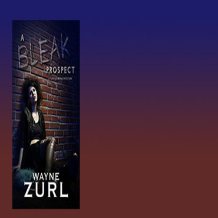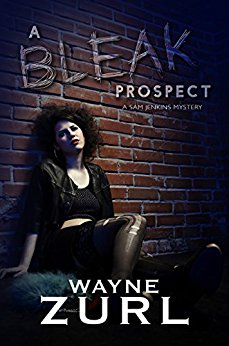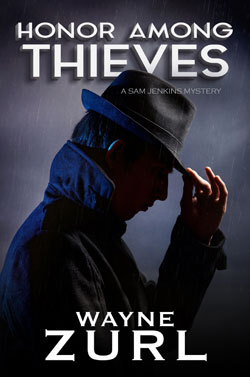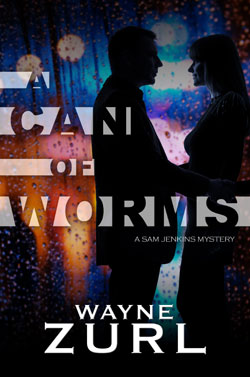Sins of Eden

 After losing their jobs at Prospect PD, veteran detectives Sam Jenkins and John Gallagher set up shop as private investigators. But their life in the private sector is short-lived when their former colleague, Bettye Lambert, the new county sheriff, enlists them to investigate a seemingly cold missing person’s case.
After losing their jobs at Prospect PD, veteran detectives Sam Jenkins and John Gallagher set up shop as private investigators. But their life in the private sector is short-lived when their former colleague, Bettye Lambert, the new county sheriff, enlists them to investigate a seemingly cold missing person’s case.
Twenty-seven year old Tommy Lee Helton disappeared from the beautiful and idyllic Orr’s Valley section of Prospect where he lived. None of his family or friends can find him and no one can provide a clue to where he may have gone.
The closest thing to a lead comes from a beautiful woman who is a member of the environmentalist group to which Tommy Lee belongs. Her information leads Jenkins and Gallagher to a paper mill reportedly discharging toxic chemical waste into the river system of North Carolina and Tennessee.
The security supervisors at the mill, a former federal agent from the Diplomatic Security Service and a retired Marine Corps sniper had a serious confrontation with Helton during a demonstration organized by the activists. They soon become prime suspects in his disappearance.
As the search and investigation continues, an unrelated murder victim is found, more anomalies spring up, people are blatantly withholding information and nothing seems to be as it appears.
The question remains, with all those obstacles, can Jenkins and Gallagher find the missing person and restore order to their little chunk of paradise on “the peaceful side of the Smokies?”
Find all the usual sales links in one place at Melange Books
Read An Excerpt
Chapter One
The paint wasn’t dry on the walls before we started moving in.
“Ya know, Boss,” John said, “we should have bought new office furniture. That would give the place a touch o’ class. This old stuff, I don’t know. Clients judge you by the appearance of your office.”
No one will ever accuse former Detective John Gallagher of being financially savvy. And his wife is no better. They had living beyond their means down to a science—spending money like Crockett and Bowie the night before the Alamo fell.
I finished rubbing dark scratch remover into a scar on top of the old solid oak desk. “First thing, John, stop calling me boss. We’re partners in this cockamamie private detective business. I have a first name. Please use it.”
“Okay, B…uh, Sam. But you know how it is, old habits are hard to break.”
“Let’s put those words to music and get Bobby Vinton to sing it. The song should be more successful than we’ll ever be.” I shook my head. “I don’t know why I let you talk me into this private cop venture.”
John look shocked that I’d question the sanity of his goofy scheme.
“It was a good idea,” he said. “According to Lonnie Ray, we’ll make lots of money.”
“And we agreed to give Lonnie Ray Wilson seventy-five bucks for every hour he spends with us working on his computer, hacking into places where we shouldn’t be. You think he’s got a vested interest in suggesting we start this business?”
“Boss, you’re the voice of doom.”
I grunted and finished buffing the top of the old desk as I sneered at Gallagher. “There, see? These things have character. Between the Salvation Army and Goodwill, I bought four desks and eight chairs. After I tipped the kids who work there for helping me load this stuff into my truck, the whole shooting match cost us $320.00. You can’t get a bottom-of-the-line new desk for that—and it would be made from some kind of poisonous Chinese flake board that would give us cancer. Who needs new furniture? These may not be genuine antiques, but they have a special kind of class. They give the place sort of a…hardboiled, Philip Marlowe look. Vintage. Like us.”
John didn’t have a chance to comment when Bettye Lambert walked into the outer office.
“Good mornin’, gentlemen. How’s the new business goin’?”
“Well,” I said, “you’re looking good. The new job suits you.”
John jumped in with a compliment of his own. “Yeah, Sarge, uh, Sheriff, that outfit is way nicer than your old Prospect PD uniform.”
For the five years I’d known Bettye, during our time together at Prospect PD, I often thought of her as the loveliest desk sergeant on the planet. Now she’s the most beautiful sheriff. Her silky black blouse clung to her figure like one of the gowns worn by the Muses and Graces living above the clouds on Mount Olympus. Her straight beige skirt showed only an inch of knee and couldn’t have been more appropriate for a newly appointed female sheriff.
John, on the other hand, looked like a slightly larger than usual leprechaun whose tie was always too short. Or were his pants always too low?
“Thank you both,” she said. “I won’t lie and say I wasn’t overwhelmed when I started this new job, but so far, so good. I’m gettin’ to like it.”
John smiled.
I said, “Good.”
“But listen,” she said. “I came to see you guys and ask how you like bein’ private eyes?”
I let Bogie answer, “Private investigators, doll-face. Save that private eye malarkey for guys like Boston Blackie. We’re high class like Marlowe and Spade. We get twenty-five smackers a day plus expenses. And I love it when a dame like you visits the office.”
“Well, thank you, Mr. Bogart. Have you been busy?”
“Honest answer?” John said. “I did one case—followed a cheating husband and his girlfriend to a sleazy motel. Not exactly the French Connection.”
Bettye smiled before asking a question, the answer to which would change our lives for the next couple of weeks. “How would you like to work for me? I’m ready to put you two on the payroll and let you use those Special Investigator badges I gave you when I became the official interim sheriff of Blount County.”
John jumped in promptly. “Yes, ma’am. I could use the money.”
I played hard-to-get. “What’s it all about, sweetheart? Come on. Spill the beans. I’m no sap. What am I gettin’ involved in for my twenty-five bucks?”
“Will you stop with that 1940’s act?”
“If I must.”
“Good. This should be right up your alley. And you get a lot more than twenty-five dollars a day.”
She took a moment to reactivate a smile I took in with my eyes, but felt all the way down to my shoes. I have problems leaving my hardboiled gumshoe character behind.
“Stanley got a missin’ person case in Prospect that he passed off to us because he’s goin’ to be in Los Angeles for at least three weeks,” she said. “His grandmother died. His family would like help handlin’ her affairs, and Prospect PD is shorthanded now that we all left. I’m low on personnel, too, what with vacations still goin’ strong and a couple of complicated cases that are keepin’ CID busy.”
“I like missing persons cases,” John said. “The Boss does, too.”
“John, I’ve asked you to stop calling me that. But you’re right. I like MP cases. Always have.”
“Ya know, Sheriff, the Boss, uh, Sam, worked missing persons cases when he first got to be a detective back in New York. He started out in Juvenile, but didn’t last long there.” John lowered his voice and looked around as if he was afraid some nonexistent person might hear him. “He told me MP cases were easy because you didn’t have to worry about Miranda or any of that stuff. He’d dangle someone out a window or hang them off a pier to get information about the missing kid.”
Bettye looked at me as if she just learned I enjoyed pulling the wings off dragonflies. “Sam Jenkins, I will not allow you to dangle or hang or otherwise physically abuse some witness while you’re investigatin’ for me. Is that clear?”
“Yikes,” I said. “Has she gotten tough or what? John, there’s no doubt who’s the new boss in town.”
“Oh, stop,” she said.
“Okay. When are you going to tell me about the case? I need to know a few things before we jump into this.”
Bettye smiled. “I’ll tell you all about it if you take me to lunch.”
“I’ll bet you’ve got an expense account, don’t you?”
“Matter of fact, I do.”
“Wow, a pretty woman with an expense account. I’d marry you if your father owned a liquor store. Let’s go someplace pricey.”
“Yeah, Sheriff, I mean, Boss,” John said, “I can call you that, right?”
“Of course you can, John,” Bettye said.
He finished with, “Where we going?”
“Not we, John,” I said. “You have to write up your keyhole peeping case for the offended woman, and then you’ve got those four boxes of crap you want to hang on the walls to deal with. I’m gonna take my blonde lady friend here and buy her a glass of cheap white wine before she picks up the tab for our expensive lunch. I’ll come back and tell you why she wants to hire us.”







 A serial killer dubbed The Riverside Strangler by the Knoxville press corps has murdered eight Internet prostitutes in East Tennessee, the most recent found floating in Prospect’s Crystal Creek.
A serial killer dubbed The Riverside Strangler by the Knoxville press corps has murdered eight Internet prostitutes in East Tennessee, the most recent found floating in Prospect’s Crystal Creek.
 Cops run into all kinds of characters on the job. But when Chief Sam Jenkins meets four people from his former life as a New York detective, it throws him for a loop.
Cops run into all kinds of characters on the job. But when Chief Sam Jenkins meets four people from his former life as a New York detective, it throws him for a loop.
 Against his better judgment, Police Chief Sam Jenkins hires Dallas Finchum, nephew of two corrupt politicians.
Against his better judgment, Police Chief Sam Jenkins hires Dallas Finchum, nephew of two corrupt politicians.
 Chief Sam Jenkins runs headlong into Tennessee’s faction of Korean organized crime when a mobster tries to shake down two former call girls attempting to establish a legitimate business. Soon, bodies begin piling up—all with a Korean connection—in Sam’s town of Prospect and nearby Knoxville.
Chief Sam Jenkins runs headlong into Tennessee’s faction of Korean organized crime when a mobster tries to shake down two former call girls attempting to establish a legitimate business. Soon, bodies begin piling up—all with a Korean connection—in Sam’s town of Prospect and nearby Knoxville.
 Winter in the Smokies can be a tranquil time of year–unless Sam Jenkins sticks his thumb into the sweet potato pie.
Winter in the Smokies can be a tranquil time of year–unless Sam Jenkins sticks his thumb into the sweet potato pie.



